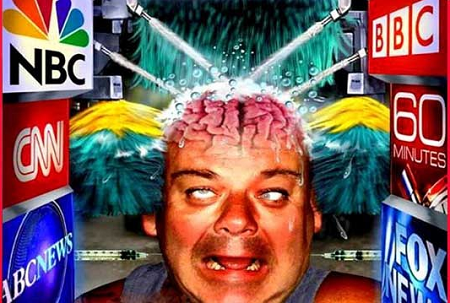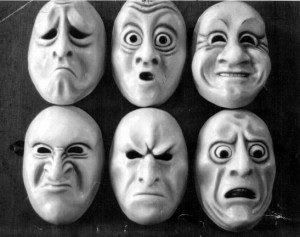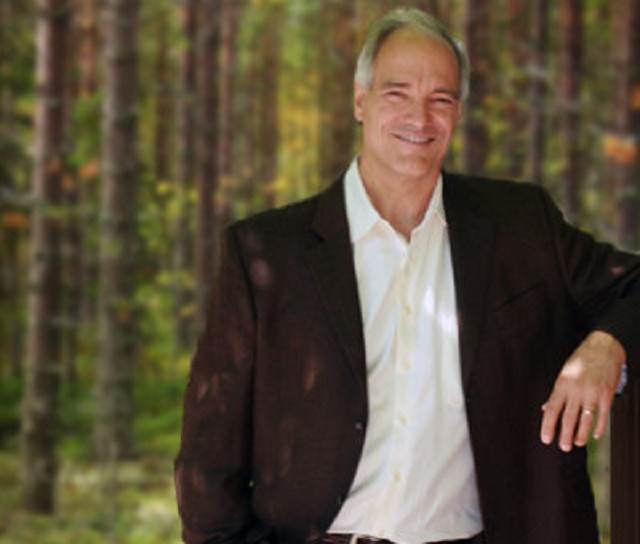Dr. Joel Wade
A CRUCIAL SANITY PERSPECTIVE FOR MASTERING OUR MOODS
Popular fads about our brains come and go – for Descartes they were machines, for Freud they were like steam engines, many today liken them to computer hardware and software.
We’re much more complicated and elegant than any of these ideas. At our foundation, we are biological organisms. Growing, learning, changing, living beings.
I find that understanding this seemingly self-evident truth makes sense of a tremendous amount of human experience; and helps to de-mystify a lot of our troubles and challenges, too. So let’s talk about surfing.
KEEPING YOUR SANITY BY MASTERING YOUR EMOTIONS AND REACTIONS
[TTP welcomes Dr. Joel Wade once again. Due to an overwhelm of clients, courses and speaking engagements, Joel was unable to continue his “The Virtue of Happiness” column for TTP. He was able, however, to make this contribution to TTP’s Keeping Your Sanity feature. Thank you, Joel!]
My fellow TTPers:
There’s plenty to be upset about with the current state of politics. But in order to gain perspective, we need to step outside of the closed loop of media generated narrative, so we can see clearly what we’re caught up in that keeps us both stressed and helpless.
After all, stepping outside media narratives is a primary purpose of our Oasis for Rational Conservatives, right?
THE VIRTUE OF HAPPINESS
 Life itself is a defiance of the principle of entropy – the tendency for matter to devolve into chaos and disorder.
Life itself is a defiance of the principle of entropy – the tendency for matter to devolve into chaos and disorder.
Life takes nutrients and the energy of inspiration and creates its own order, its own structure, and its own direction. As human beings, our consciousness allows us to take this process a step further, expanding it into a different dimension: To decide consciously to move in a particular direction; to create, to engage, to love.
So a human life that is happy is not a trivial matter of being lucky, of getting what we want; of pleasant pastimes or the absence of responsibilities or pain.
A human life that is happy is an accomplishment; a triumphant, sometimes even a heroic creation.
To create a life that is truly happy over time takes discipline, passion, and courage. A happy moment can be a matter of luck; a happy life requires virtue.
THE BENEFITS OF IGNORING TV NEWS
 Sometimes, what’s most important for our sense of happiness and well-being is what we don’t do.
Sometimes, what’s most important for our sense of happiness and well-being is what we don’t do.
There are vices such as smoking, alcohol and drug abuse, and impulsive anger that very clearly and predictably can destroy our health and happiness.
But of the common hurtful behaviors that come up with my clients year after year, one stands out significantly: watching TV.
I don’t mean watching an occasional show or movie at home. Nor do I think we have to get rid of our televisions entirely. But every time we sit down and turn on a news show, we’re likely to feel worse by the time we’re finished.
This is true to a lesser extent with news or talk radio – and how we spend our time online – but I want to focus on the presentation and powerful images of TV news. Here’s the problem with TV:
WHAT MEMORY IS AND IS NOT
This immortal scene of Maurice Chevalier and Hermione Gingold in the 1958 movie Gigi is so endearingly charming because Chevalier is so good-natured about his misremembrance.
It’s often difficult, however, to be that way regarding our memories.
Understanding what memory is – and is not – can do wonders for our relationships, our self-awareness and our peace of mind.
Sitting at the table at Thanksgiving, a family member might recount a memory of an event from your childhood, talking about what you experienced as if his perception of your sentiments on the subject is a fact.
How does that make you feel? Probably at least a little annoyed. He, after all, did not have your memory. He had his memory.
You were both there in the same place at the same time, but you were having your experience of the event and he was having his. The two experiences could be worlds apart.
We’ve all had those arguments where one of us remembers things one way, and the other remembers it differently. For instance…
WHAT ARE EMOTIONS ANYWAY?
 Back in the days of Sigmund Freud, the world was powered by steam. Everything was pressure, force, heat, release of pressure, explosive pressure. Pressure, pressure, pressure…
Back in the days of Sigmund Freud, the world was powered by steam. Everything was pressure, force, heat, release of pressure, explosive pressure. Pressure, pressure, pressure…
Because we tend to understand ourselves in relation to the world we live in, Freud and his students created explanations for emotions, drives and instincts in terms of build-up and release, just like the steam engines of their time.
This formed the basis of the charge/discharge theories of emotional release that were influential in psychotherapy and pop psychology in the 1960s and ‘70s, and into the ‘80s.
Fortunately for us, we aren’t steam engines. We’re also not computers either. The best that such explanations do is give us the illusion that we understand ourselves through an analogy or metaphor.
Analogies and metaphors are fine as far as they go, but the computer analogy doesn’t do justice to the complexity of our creative, living systems. And the steam engine analogy doesn’t do justice to our emotions.
So just what are emotions, anyway?
LOVE AND ANTHROPOLOGY
In 1988 with Jack Wheeler, I made first contact with a band of hunter-gatherers known as the San people in Africa’s Kalahari Desert.
These people had spent their whole lives completely isolated from the whirling, chaotic, mind-blowingly complex world in which most of us live – having had no contact with any people outside of few other small bands they would occasionally come in contact with.
We were a bizarre lot, the handful of us who camped out nearby – though not too nearby to be intrusive. In turn, their lives were equally strange to us (well, maybe not to Jack – this was his third “first contact”). They wore gazelle-hide loincloths and no shoes, and lived on a very sparse fare of roots, wild melons and whatever game they could snare or hunt. They had huts built out of small branches, but they usually slept outside of them, circled close to the fire.
In the evenings, they would sing and dance around the fire, chanting in a rhythmic call; at times, one of the men dancing would fall into a deep trance. He would be brought back to consciousness by the others rubbing hot coals on his body. The belief is that those who fall into a trance go to the other realm, bringing back wisdom for those who remained.
It was a grand adventure for me. It affected me deeply, helping put some of my priorities in perspective and adding to my appreciation for humanity’s richness. It also inspired me later on to write a children’s book, The San People of the Kalahari.
And it taught me something about marriage as well.
THE ADVENTURE OF EMPATHY VS. THE FAILURE OF CURIOSITY
Within each of us exists a deeply personal, subjective inner experience. We each have our own DNA, our own history and our own very personal experiences.
We have the stories we’ve created that hold the meaning of our experiences and the feelings that flow from those stories.
We have the choices and actions that have formed our character – and the people, opportunities and relationships that have influenced us, blessed us and challenged us.
Within every person is a world, and our personal worlds are more unique, strange and magnificent than most of us realize. Grasping this can turn our relationships from stale melodramas into rich adventures.
In my work with couples, the most common source of trouble is not grasping this, the cause of which I call a failure of curiosity.
SUPPORTING YOUR KIDS WITHOUT OBSESSION
“If the path before you is clear, you’re probably on someone else’s.” – Joseph Campbell
 Since the dawn of time, parents have wanted the best for their kids. They’re our link to the future beyond our own time here on Earth.
Since the dawn of time, parents have wanted the best for their kids. They’re our link to the future beyond our own time here on Earth.
More importantly, we feel a connection with our kids: a visceral bond. When they’re happy, we feel delight. When they hurt, we feel pain. When they succeed, we feel proud. When they fail, we feel the loss.
It’s natural to want good things for our kids. We want them to grow into strong, good people. We want them to have work they love that enables them to live well. We want them to find good friends and a wonderful mate with whom they can grow a beautiful, loving life.
We want them to succeed.
But there’s an expression of this natural sentiment that’s growing across a large spectrum of our population. It troubles me.
THE POWER OF EMBODYING EMOTIONS
Last week in Using Your Sixth Sense to Change Your Life, I wrote how building more awareness of our physical sensations can help us make essential positive changes. And I described the different sensory systems that allow for this.
Today, we’re going to look at how those same physical sensations can help us master our emotions as well.
For many of us, emotions are something of a mystery. On the one hand, they can be delightful. They give life meaning and depth that would be otherwise impossible. On the other hand, they can be uncomfortable. They can hinder and disturb us. Anger, in particular, can sometimes cause a whole lot of very big trouble.
Learning to feel, understand and use our emotions is central to mastering the complexity of life. Our emotions become much clearer and easier to use the more we pay attention to the physical sensations that go with them. Let’s start learning how to do this.
USING YOUR SIXTH SENSE TO CHANGE YOUR LIFE
We’re all familiar with the five senses: sight, smell, hearing, taste and touch. But we have another whole world of sensation that is often overlooked. It’s central to our power to change our habits – and our lives – for the better.
The “sixth sense” that I’m talking about is not something mystical or hypothetical. It is our felt sense. It’s the physical sensations in our body – in our limbs, in our motions, and in our guts.
The latter, for example, is a very real internal sensory experience from our enteric nervous system. This is a nerve complex connecting our brains with our gastrointestinal system, heart and lungs through our vagus nerve.
It’s the second-largest nerve in our body – about the same size as our spinal cord – that carries information from our guts to our brain. And growing our awareness of it can become a tremendous resource for growth and change. Here’s how to do this.
HOW TO USE WRITING TO HELP TRAUMA AND TROUBLES
"When we're traumatized by something, there are things that we can do to be able to bounce back as best as we can. One of those things is writing.When I say "bounce back," I don't mean "just pretend that everything's okay." There are experiences that are so horrible that we really never completely bounce back from them. But there are things we can do that will make our situation worse, and things we can do that can make them better.Something that can make a trauma - or even just a troubling conflict or major life change - worse is to keep it a secret. It can be easy to keep it a secret if it is also something that we feel ashamed of. What I will show you is a good step to help you through that."
EARNING A REPUTATION WITH OURSELVES
When we get to know people, we are, in part, building a reputation with each other. "What kind of person is he?" "How does she handle a difficult situation?" "What kind of attitude does he bring to his work?" "How does she respond to confrontation or adversity?"
There are multitudes of small interactions that give us information about a person’s character and personality, values and integrity. Over time we come to decide whether this is the kind of person we want to spend time with; whether we like how we feel when we’re with them.
Here is a piece that is often missing: We watch ourselves just like we watch others, and we develop a reputation with ourselves accordingly.
This is the essence of earned self-esteem.
What kind of a person are you, in your own assessment? Do you have values, goals, and priorities? And do you act in accordance with those values, goals, and priorities? Are you the kind of person you would like to be? And if not, what are the barriers to becoming the kind of person you would like to be?
HOW BIG IS YOUR FEAR?
What kind of things are you afraid of? Fear is a natural and necessary emotion. It tells you that there is danger, or potential danger, and that you should become more vigilant, narrowing your focus to search for, isolate, and avoid or escape the danger. Sometimes what we fear is not dangerous at all. We can feel fear at expanding opportunities, or new situations, or exciting experiences.
Sometimes switching the word "excitement" for the word "fear" can be a clarifying and liberating experience. Try switching the two the next time you feel afraid of something good and expansive. You might just discover some excitement there that you had overlooked. Being afraid of things from time to time is part of life. It is normal, healthy, and can sometimes offer you the greatest opportunities to grow in resilience, success, and wisdom. It’s being afraid all of the time about something that’s not so good.
THE TRUE PATH OF HUMAN EVOLUTION
A lot of people believe that human nature is evolving and changing in some significant manner. This comes in part from a social psychological notion that culture can change human nature, and that different cultures therefore create, to a significant degree, different people.
If human nature were indeed so malleable, then it could be argued that we can evolve that nature into something different. But human nature is not that malleable. Human nature is pretty much what it was thousands of years ago.
Even so, we are certainly in a better condition, particularly in the West, than our more primitive ancestors. So what is it, exactly, that is changing and evolving in us that leads to such improvement?
Human culture: the understandings, innovations, and meaning that we are able to teach to others, and pass down through the generations.
So -- what are the common features of successful human culture? Knowing this would place us on the true path of human evolution.
HOW NOT TO USE SHAME
Like all emotions, shame serves a function; we feel it when we do something that violates our values. Shame is a particularly excruciating emotion, and it lets us know we’ve done something we never, ever want to do again.
Trying to let go of shame without changing our behavior is like trying to let go of physical pain while continuing to hold our hand on a hot stove. If we keep burning our hand, we’ll keep feeling pain; and that pain and the damage it reflects will intensify. If we keep behaving shamefully, we’ll keep feeling ashamed, and the damage our shame reflects will intensify.But holding onto shame after we’ve learned from and corrected our mistakes is like holding a match to our formerly stove-burned hand to remind ourselves how much it hurt. The pain we inflict is no longer relevant. And we’re actually more likely to repeat the shameful behavior when we continue to torment ourselves.
LOVE AND VISIBILITY
When we love someone, and they enter a room, that room gets a little brighter for us, like the lights have been turned up a notch. What brings that glow, that brightness from another fellow human being? Love is too rich and complex to boil down to some single facet or data point; but one of the essential elements that goes into feeling love for one another, is the experience of being seen. Love is fundamentally about seeing, hearing, and knowing another human being deeply. We cannot do that from within our own idealistic fantasy. We have to come out and look into the eyes; listen to the voice, the thoughts, the dreams; and feel the heart of another.
That’s when we get to feel that great resonance; that sublime emotion of being touched with love by the soul of another; and reciprocating that love back in a benevolent cycle of visibility and trust.
COMMIT TO LIFE WITHOUT CRISIS
I’m used to hearing from people in crisis. As a psychotherapist and life coach, it’s part of my business. It may be a crisis in a marriage, a crisis at work, a financial crisis… There are many places for crises to wreak havoc in our lives.
Some crises are unavoidable. We control only so much of what happens in our lives, and sometimes life throws hardship, tragedy, or deeply chaotic circumstances our way.
I don’t make light of or gloss over the realities of life; but I do make it my business to help people to avoid unnecessary troubles, and there is one thing that we can do to prevent some of the more predictable crises of life.
We tend to use the passive voice to describe our troubles: An affair “just happened.” The project “just fell apart.” No author, no identifiable cause. The passive voice puts us at the mercy of events; the active voice is the voice of self-ownership and commitment.
A lack of commitment to our highest values can create tremendous anxiety; and turn every conflict, every decision, and every challenge, into a potential crisis. Every small problem can throw the entire commitment into question… And that is a major source of avoidable crisis.
Now to the practical application, a tangible plan of action for a life without unnecessary crises.
THE MOST IMPORTANT MOMENT
A marriage, a friendship, a close family relationship… all of our important relationships are built on countless moments, innumerable interactions that either build qualities of trust, joy, and respect - or undermine those qualities.
Today I want to show you what is arguably the most important moment for building a trusting, satisfying, loving relationship. We can often think that what makes a difference in a romantic relationship, or our relationship with our kids, or other friends and relatives, are the big things; the romantic getaway for the weekend, or the great gift that we buy.
…but there is a moment that packs more leverage, more meaning, and more potential for doing good – or harm – than almost any other. It is the moment when…
HITTING THE PAUSE BUTTON
Anybody can become angry – that is easy; but to be angry with the right person and to the right degree and at the right time and for the right purpose and in the right way – that is not within everybody’s power and is not easy. – Aristotle
It’s easy to get caught up in emotions, to follow the flow and intensity of our impulses. It’s natural… animal… primal. And without intervening with our consciousness, it can be dangerous. This is how we operated throughout much of human history… which is why most of human history was so terribly, horribly violent.
It’s also what characterizes violent criminals.
But it’s not how most of us today usually operate, because we have a choice. Over time, particularly through the Enlightenment, we’ve culturally refined our ability to choose – and that ability is central to what makes us human.
When we feel like reacting with anger, fear or hurt feelings – anything that feels like it’s an automatic, purely emotional response – we can react without thinking, blindly following the tides of our emotions.
Or we can choose to do something different.
HOW TO LIVE YOUR LIFE ON PURPOSE
Look behind every championship team and you'll find an extraordinary coach. That's why men like John Wooden, Vince Lombardi, Bear Bryant, Don Shula and Phil Jackson are household names.
The same phenomenon exists in business. What would Apple have been without Steve Jobs or Berkshire Hathaway without Warren Buffett? In our own lives, we face personal challenges too. We often get off track or struggle in our personal relationships. Wouldn't it be great if someone could consult with you and guide you, to lend encouragement and practical advice to help you live the life you've always dreamed of living? Well, in fact, it is possible. There are now hundreds of licensed psychotherapists and family counselors in the United States who work as certified life coaches. I know. I'm one of them. As a life coach, my goal here in these Virtue of Happiness columns – for 12 years now in To The Point! – is to show you:
- How to maximize your wellness.
- How to live your life on purpose.
- How to design and create the life you desire.
- How to be a catalyst for others' growth and development.
- How to be a better spouse (or partner) and effective parent.
Let me begin by explaining a little bit about what I do...
HOW TO ENLIVEN YOUR DREAMS
Have you ever tried to start an exercise program on your own?
There are many private galleries of home exercise equipment displayed as modern art, masterpieces such as a treadmill transformed into "Clothes Tree," racks of dumbbells as "End Table," and rowing machine as "Hurdle."
The abundance of such a range of home art displays is not, sad to say, a phenomenon of mass creative genius. It is a function of the difficulty of focusing our will consistently in multiple directions.
It takes willpower to decide to establish a new habit, and without some kind of support for this new habit – in the form of a clearly defined commitment, some kind of accountability, and incorporation into a daily routine – our dynamic potential of a new, positive habit can become stuck in the regret of an unrealized vision.
There are also certainly many people who use their home gym consistently and effectively. There are people who do establish new habits of regular exercise that they stick to on their own. What is the difference?
IS HAPPINESS SOMETHING WE CAN MASTER?
Are you happy?
Uncountable millions have asked that of themselves or of others for thousands of years. Yet depending on when in history this question is asked, it would mean something very different.
Today, we live in a time where our overall health, opportunities, and options would be considered nothing less than miraculous to our ancestors.
In addition, the practical knowledge we have today of how our choices, thoughts, and habits affect our own experience allows us to be active participants in our own happiness in ways that would have mystified most people through history.
For the Ancient Greeks, happiness was being lucky or blessed (makarios) -- favored by the gods to enjoy prosperity and avoid suffering.
This puts the thoughts, choices, and actions that can lead to happiness outside of our own direction, outside of our own personal agency.
Happiness from this perspective is a matter of luck, not something you can actively influence. But you can. Let’s talk about how you can.
TURNING A WISH INTO A TRIUMPH
Have you ever watched the downhill skiers in the Winter Olympics before a race, visualizing the run, moving and swaying their bodies as though they’re on the run itself? They all do this now, because the visualization is a powerfully effective strategy for bringing out their best.
But they aren’t picturing themselves with the gold medal and the national anthem playing. They’re crouched down in a skiing stance, imagining how they’ll negotiate the challenges of the run, practicing the specific skills that will get them to that gold medal.
Much is made these days of having a compelling future vision. Picturing yourself on the winner’s block, or with that book published, or that wonderful relationship; imagining a future that you can step into… The pop psychology literature is chock full of advice for seeing yourself having accomplished your goals.
But the pop psychology literature on this is wrong.
When we imagine having already achieved our goals, part of what happens is we feel like we’ve already achieved our goals; and because we feel the reward of the accomplishment already, our motivation to do the inevitable hard work required for any meaningful goal fades.
Dreams that matter are not easy; they take time and considerable effort. Here’s how to effectively turn a wish into a triumph.
TRUST AND FREEDOM
Trust is the foundation of a free society. If we can’t trust the average person to be reasonably considerate and responsible, the alternative is tyranny: lots of laws, and greater power to force hundreds of millions of (other) untrustworthy people into behaving according to somebody’s vision of virtue.
Much of what we see in the media, are taught in college, and are told by pundits carries a strong message that the world is a horribly dangerous place, where trust is not justified or common.
But the truth is exactly the opposite. In a free society with a reasonably coherent rule of law we do in fact have great reason to trust one another… and to expect that trust to grow. We don’t need perfect trust, or perfect behavior - whatever that would be. Here’s how trust and freedom reinforce one another.
A HAPPY LIFE IS NOT PERFECT HAPPINESS
There is a great misunderstanding about what it means to live a happy life, and it can be summed up in the popular symbol of the smiley face.
Now, I like to smile. I love feeling that kind of glowing, delighted state of emotional bliss. It’s wonderful to be full of joy and love and laughter. But feeling those things doesn’t in and of itself make for a happy life; and just because we don’t happen to feel them in the moment doesn’t mean we are unhappy.
In fact, if simply feeling those emotions all the time was what constituted happiness, and if Aristotle was correct in saying that, "Happiness is the meaning and the purpose of life, the whole aim and end of human existence," then it would be a simple matter to find the right combination of drugs that would perpetually bathe our neurons with joyful chemicals, and we could all be perpetually happy and fulfill the aim and end of our existence.
But this smiley face view of happiness is a mistake.
THE MORAL VIRTUE OF SELF-INTERESTED WORK
It is wonderful to give to and help others. We are appreciated when we give to others through charity, volunteering or other acts of kindness.
And rightly so. When we help another person in some way, it creates a spirit of goodwill, and it’s one of the single most important acts we can do for our own happiness.
What’s often overlooked is how much consciousness, caring, time, money and energy we already put into significantly helping other people every day – just through the work we do.
It’s popular to dismiss all of our work by saying we are doing it for the money – as though earning money cheapens our efforts, and makes our efforts base, selfish, or materialistic.
But earning a living from what we do makes it possible and reasonable for us to do it. When demagogues lecture young college graduates to forego making money and do something else to help people, they are telling them that what we do to make money does not help people.
This, of course, is the exact opposite of the truth.
YOU’VE GOT TO WANT IT
When someone calls me for coaching, once we’ve established the goals they want to accomplish, one of the first questions I ask is, "Why is it important for you to reach these goals?"
If the reason is something like "My parents want me to…" or "My boss wants me to…" or "I’m supposed to…" I know we have some more talking to do, because somebody else wanting us to do something is rarely a strong enough motivation to make changes in our lives.
Changing behavior, learning new skills and overcoming personal limitations all take consciousness, time and willpower. Habits are powerful forces; we can change them but not lightly. Frankly, we have to have a darned good reason to change.
Here’s the secret to change and how to access it.
TEMPTATION AND SELF-MASTERY
Aristotle, in his Nicomachean Ethics, called it akrasia – a weakness of will, acting in a way contrary to our consciously held moral values. It’s the quality that most distinguishes criminals from the rest of us; and the quality that most distinguishes less successful people from those who are more successful.
The ability to resist our short-term impulses and desires and to focus instead on our long-term values and goals is the most important capacity for living well.
In the late 1960s, Walter Mischel, a professor at Stanford University, conducted one of the most important experiments in psychology. It’s now called The Marshmallow Test, but marshmallows were only one of a variety of treats used to tempt young limbic systems to indulge in their immediate desires.
THE DIFFERENCE THAT MAKES ALL THE DIFFERENCE
Here’s what’s confusing about happiness: On the one hand, we can think that happiness means simply being cheerful. On the other hand, it’s supposed to be about a long-term sense of meaning and joy. Then we’re told momentary pleasures are often just habitual resignation to temptation… There are so many different notions of happiness, how do we make sense of it?
If momentary pleasure is bad, then why do we feel so good when we succeed at something, or have a wonderful time with a loved one, or have a good workout?
I’ve talked about the deeper, long-term sense of happiness that we earn over time; today I want to clarify something about the immediate feelings of happiness that will make more sense of these emotions – and make it easier to have a genuinely good time.
THE PLAYFUL MARRIAGE
A marriage is not a game; it’s not a trophy to win or a position to battle for. A marriage is a connection between two people who love each other, trust each other, respect each other and enjoy being with each other. It’s not about winning something over the other person; it’s about achieving something together, with the other person.
A happy, committed relationship is a collaboration between two people creating a life together, sharing a common direction, common values, common dreams. A marriage is a team of two committed, devoted allies.
The heart of a relationship comes through small, daily encounters that create an atmosphere, through a reputation between two people for what they can expect together and through “rituals of connection” – the things we do regularly that bring us closer.
One of the most important ritual of connection, one of the most overlooked qualities of a happy, successful marriage is playfulness.
ARE YOU TRULY HAPPY?
Depending on when in history the question above is asked, it would mean something very different.
Today, we live in a time where our overall health, opportunities, and options would be considered nothing less than miraculous to our ancestors. Practical knowledge of how our choices, thoughts, and habits affect our own experience allows us to be active participants in our own happiness in ways that would have likely mystified most people through history.
The Ancient Greeks would say that we, as a culture, are incalculably lucky or blessed. I think most of us would acknowledge that, but we would also think that the creative acts of relatively free, conscious people had something to do with our blessings as well. In a way that the Ancients could not fathom, we have today the potential to more actively pursue the virtues that bring greater happiness.
I’ve spent decades – my entire adult life, in fact – studying, writing, lecturing, and counseling clients about mastering their potential for genuine happiness. I’d like to share what I’ve learned with you.
THE ARTISTRY OF FIGHTING ENTROPY
Entropy is a term from physics that describes the tendency for matter to move from order to disorder. Life can be seen as deliberately working against entropy.
If you ever watched the old Get Smart TV show – or the recent movie (which was actually pretty funny) – the good guys were called “Control,” and the bad guys were “Chaos.”
For living creatures like us, that pretty well describes the situation. Chaos is where entropy draws everything naturally; control is the conscious ordering, the structure that we have to impose on ourselves and our environment in order to survive and flourish.
We train our own brains to hold the structure of our lives. The habits that we practice daily, weekly and monthly are all based on neural pathways that we have established in our brain that make it easy and natural for us to follow these routines.
These habits – if they are good ones – help us to resist entropy and have a sense of meaning, purpose and direction. But if they are bad ones, entropy takes over our lives. Resisting entropy can be a very productive art form. Let’s see how we can do it.
THE ANTIDEPRESSANT IN YOUR REFRIGERATOR
About 20 years ago, my mom gave my then-new bride and me what has over the years become one of our most use-worn cookbooks: The Mediterranean Diet Cookbook. Being someone at the time who enjoyed eating whatever I wanted, a cookbook with the word “diet” in it would not normally grab my attention.
But fortunately my wife is smarter than me, and I love olive oil, garlic, tasty spices and fish, so these were and are recipes that have never felt like diet food. Throw in a little red wine, and you’ve got a regular celebration.
The idea is that by eating food that features a variety of multicolored, nutrient-rich vegetables, low in saturated fats, with an emphasis on more omega-3 fatty acids (found in deepwater ocean fish like salmon), our hearts and the rest of our bodies can be much healthier over time.
But this story is becoming much more interesting. It looks like the food we eat may have a lot to do with our psychological and emotional health as well.
THE BEST MENTAL EXERCISE IS PHYSICAL
WE NEED A SENSE OF AWE
[Note: TTP is happy to congratulate Joel Wade as the goalie of the Santa Barbara Masters Water Polo team which just won the US National Championship on June 14. Here's the team after their victory - Joel is standing 3rd on the right.]

YOU GET GOOD AT WHAT YOU MEASURE
Measurement is the first step that leads to control and eventually to improvement. If you can't measure something, you can't understand it. If you can't understand it, you can't control it. If you can't control it, you can't improve it. - H. James HarringtonOur ability to learn is based on feedback. There is a whole field of study of psychophysiology and biofeedback that is dedicated to helping people learn to control aspects of their physiology, including certain brainwaves, in order to achieve greater relaxation, lowered blood pressure, and other psychological and health benefits. But we don't need that level of sophistication in order to make use of biofeedback. Our own bodies, and many common devices, give us plenty to go on... if we pay attention. This holds the key to taking charge of much more of our psychological and physiological existence than many of us know. Thomas Jefferson once said that the price of liberty is eternal vigilance. I would say that goes for the price of self-ownership and effective living, too.
FROM HELPLESS DISASTER TO SOLVABLE PROBLEM
When we approach any problem, how we approach it begins with an idea, a belief, a story about what that problem is, and what needs to be done about it. To considerable extent, we can choose the fundamental belief or premise from which we approach any problem... and how we frame a problem can be the very key to success or failure. Currently, the widely accepted premise is that psychological problems - depression, anxiety, obsessive compulsive disorder (OCD), attention deficit hyperactivity disorder (ADHD), addictions et al - are abnormal phenomena. They don't belong here. They were brought to us by some unfortunate circumstances - an unhappy childhood, a personal weakness, a society that's sick. They're polluting the system, like a harmful bacteria or virus, and we want all trace of them eliminated immediately. What if that premise is wrong? I've been working with people as a teacher, a marriage and family therapist, and a life coach for 35 years now. I started with that premise of problems as aberrations - the "disease model" of psychology. I don't buy it anymore. Let's explore a different premise, and see where it takes us. The explorations starts with asking certain questions.
SERIOUS PLAY
A relationship can have complex and unique needs at any given time, so there isn't really a "one size fits all" panacea for troubles. But of all the specific actions we can take to improve our relationships, I have found none that apply as often or as effectively as this: Be playful. Sounds easy, doesn't it? But it's more challenging than meets the eye, and there are clear guidelines for it to work: We have to play as an ally, as a member of the same team; we have to be for our mate, our child, our friend; and the play must have a spirit of love, kindness and optimism, as opposed to cynicism or sarcasm. There cannot be bitterness or resentment clouding the play; it's the combination of creative, interactive flow and positive emotions that elevates us. If you're up for the challenge, you're in for some pleasant surprises. Here's how to be seriously playful.
THE POWER OF HABIT
For most living creatures, instincts take charge of the necessary ordering that life requires: finding food, finding a mate, sleep cycles, protective behavior. But we humans are different in a fundamental way: our basic survival tool is our conscious mind, and unlike instinctual animals, we can choose to use our basic tool of survival... or not. Because of this, we can do something pretty amazing: with our conscious minds, we train our own brains to hold the structure of our lives. We do this by creating habits. The habits we practice daily, weekly, monthly... are all maintained through neural pathways that we've established in our brain that make it easy and natural for us to follow these routines. These habits - if they are good ones - help us to build a sense of meaning, purpose and direction. They are what allow us to persevere and reach long term goals. Without habits, we'd need to use our willpower for every single action we take. The trouble is, we acquire many of our habits by default - from routines that our family valued and practiced or that we learned in school or from influential people in our lives. So here are some tips on how to get rid of bad habits and acquire good ones.




 Join the forum discussion on this post
Join the forum discussion on this post